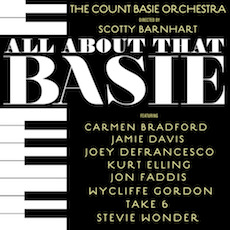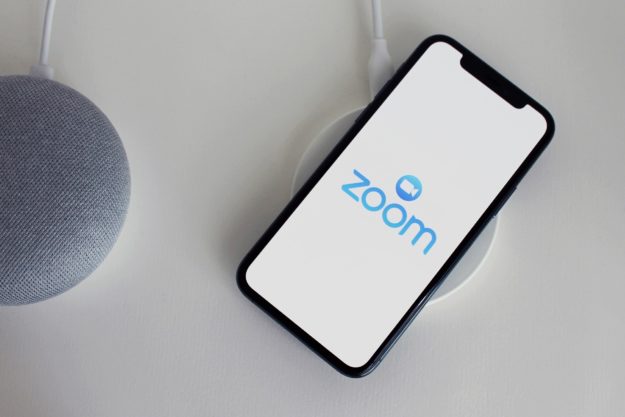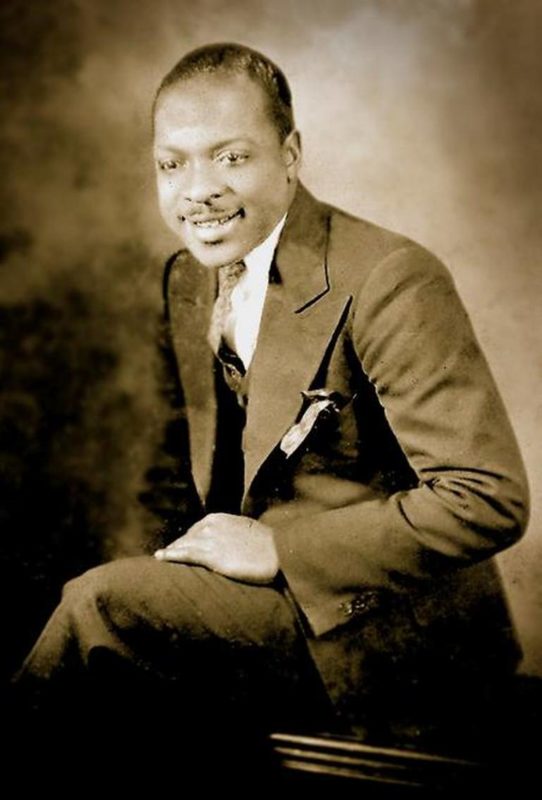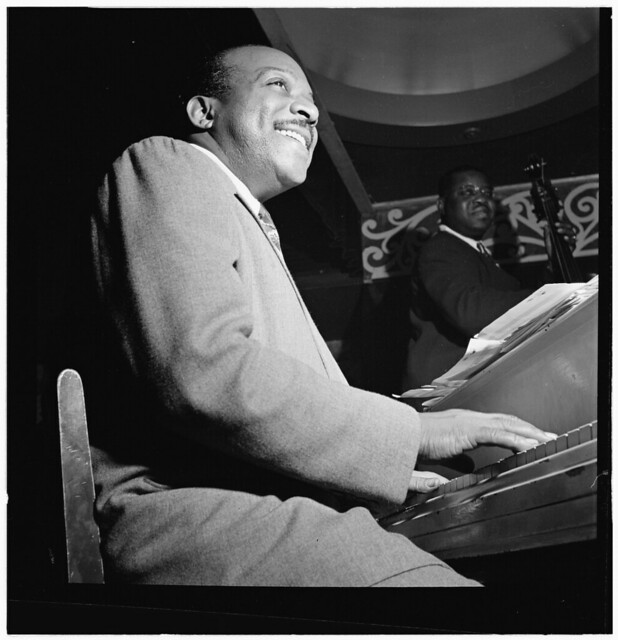11/12/2019

Copied from Arstash.com – Bill D (https://arstash.com/cd-release-the-count-basie-orchestra-all-about-that-basie/)
If only…
If only Wynton Marsalis could have been in The Duke Ellington Orchestra.
If only Rudresh Mahanthappa could have met Charlie Parker.
If only Pat Metheny could have sat in with Wes Montgomery.
If only Kurt Elling could have sung with The Count Basie Orchestra.
But wait a minute. Kurt Elling does sing with The Count Basie Orchestra. On All About That Basie, Kurt Elling, when he sings “Don’t Worry ‘Bout Me,” revisits the joy of Sinatra’s work with Basie—documented on Sinatra-Basie, It Might As Well Be Swing and Sinatra at the Sands.
Respectfully channeling the spirit of those recordings, Elling performs
with straightforward attention to each word. Effortlessly, Elling
incorporates the original’s direct-to-the-heart crooning and their
inherent swing that marked the success of those albums, even as the
recognizable baritone stylings remain Elling’s during the song’s brief
inclusion on Concord Jazz’s new album.
If only Count Basie could have adapted in big-band arrangements the
songs of talent like, say, Justin Timberlake, Prince, Beyonce or Adele.
But The Count Basie Orchestra does play Adele’s “Hello” on All About That Basie. The
performance isn’t an instrumental repetition of the way Adele sings the
hit. Rather, it possesses the cohesive movement trademarked by the
Orchestra over its now-83 years of existence. The tightness of the
entire orchestra’s sound as it plays the melody—and the breakout into
eloquent solos without ostentation by trumpeter Kris Johnson and pianist
Bobby Floyd (eminently qualified to perform the Basie parts after five
years with the Orchestra)—suggest the high level of musicianship offered
by the Orchestraom 2018.
The Count Basie Orchestra didn’t stop performing, touring or
recording after Basie’s passing in 1984. Its unmistakable sound, whose
positive approach made listeners’ lives a little happier and whose
infectious swing brought listeners closer together, remains up to this
day through a series of leaders, including Thad Jones, Frank Foster,
Grover Mitchell, Bill Hughes, Dennis Mackrel and, now, Scotty Barnhart.
Proof of the everlasting appeal of Basie’s music, the orchestra’s
popularity continues undiminished. As a celebration of everything
associated with Basie’s music, All About That Basie includes an
array of well-known performers whose mission that they chose to accept
was a representation of Basie’s absorption of and adaptability to
changing music styles through much of the twentieth century and into the
millennium.
The unsurprising characteristic of all eleven tracks of the album is
the consistency of the orchestra’s sound as it makes each song its own.
The most famous example would be “April in Paris,” inducted into the
Grammy Hall of Fame. That song’s matchless arrangement forever recalls
The Count Basie Orchestra. That association of the song with Basie is
visually documented by Mel Brooks’s Blazing Saddles, which
unforgettably and hilariously showed the Orchestra performing the song
in a desert, Basie greeting Clevon Little, decked out with Gucci
saddlebags, as he stands from the polished white grand piano. Shrewdly,
instead of merely replaying that same arrangement, heard many many times
over the years, Barnhart’s version on All About That Basie features
the Hammond B-3 organ. Joey DeFrancesco plays as a solo the melody and a
chorus of improvisation backed by the signature trombone phrase, as
well as by the full Orchestra, including its One More Time (but not the
One More Once).
The 2018 celebration of Ella Fitzgerald’s collaboration with Basie
features Carmen Bradford, whom Basie selected as a singer for the
original Orchestra. What makes this performance even more significant is
the fact that Benny Carter’s arrangement of “Honeysuckle Rose” had
never before been recorded. In its premier performance, Bradford sings
with joy and ever-present vitality that distinguished the original
performance of the song on Ella and Basie! Channeling the
essence of Ella with her infallible sense of swing and scatting,
Bradford is entirely comfortable with the power of the band behind her.
Indeed, she seems to be energized by it.
Part of the appeal of The Count Basie Orchestra is its dynamics. Its
containment of power, as the band’s sections blend a broad spectrum of
harmonization until its full strength is realized, never fails to
fulfill audience expectations. Barnhart’s addition to the Basie
Orchestra’s repertoire, “Tequila,” certainly lives up to that
reputation. Muted trumpets, conguero Luisito Quintero and guitarist Will
Matthews introduce the danceability of the composition. And then
trumpeter Jon Faddis comes in, initially understated in Dizzy terms,
before moving chorus by chorus into even more combustible territory. His
medium-volume start evolves into an exciting finish of unrestrained
might, an open trumpet section’s is-it-live-or-is-it-Memorem? Volume,
and Faddis’s stratospheric high notes.
All About That Basie recollects the band leader’s early
years as Jamie Davis pays a vocalist’s tribute to his respected
influence, Jimmy Rushing, whose Kansas City singing experience included
years with Walter Page’s Blue Devils and Bennie Moten’s band before
joining Basie’s. Accompanied by the band’s shuffle beat, with licks
provided by trumpeter Barnhart and saxophonist Rickey Woodard, baritone
blues singer Davis engages audiences with direct appeal, telling stories
through singing, and then moving into a spoken plea for listeners to
“come back to me.”
Similarly, Take Six re-interprets the mid-fifties Basie/Joe Williams
hit, “Everyday I Have the Blues,” with impeccable Gene Puerling-like
harmonies as the Basie band, all the while, provides the accented
punches and a pulsating irresistible swing. Wycliffe Gordon makes
memorable the Orchestra’s new arrangement of Earth Wind and Fire’s
“Can’t Hide Love,” not as a replication of the melody, but as a
plunger-muted, trombone-talking takeoff into highest-quality
instrumental adaptation.
Yet another highlight of the album is Stevie Wonder’s participation
with the Orchestra in performing harmonica on, but not singing, his own
song, “My Cherie Amour.” The musical palette for the arrangement already
existed on albums like The Atomic Mr. Basie, which included Neal Hefti’s inimitable arrangements. Except
for the all-out back-beat swing of the track’s final choruses, Wonder
plays harmonica throughout over the “Li’l Darlin’”-like unrushed,
unified sound, unmistakable as Basie’s.
As a drummer not only with The Count Basie Orchestra, but also with
Frank Sinatra, Ella Fitzgerald and Stevie Wonder, Concord Records
producer Gregg Field recognized through personal experience the
significance of Basie as a musical icon in American music. If only
Basie, who developed the orchestra’s distinctive sound, were still
recording. But his Orchestra is. Along with Barnhart, who has
kept The Count Basie Orchestra’s vitality undiminished, Field was made
available yet another reminder of the gentle force of the Orchestra that
has endeared it to audiences for decades.
Artist: www.thecountbasieorchestra.com
Label: www.concordmusicgroup.com







